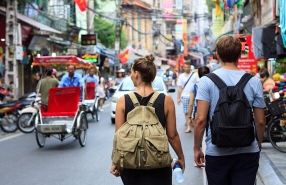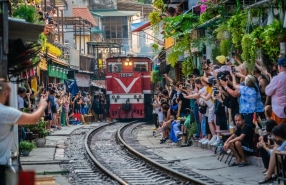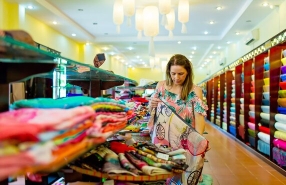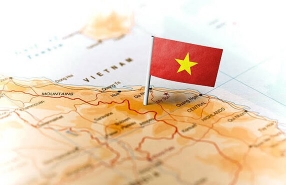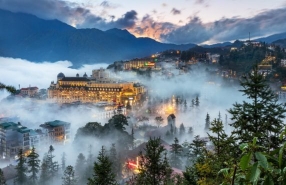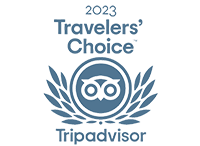What Is Hanoi Famous For? Discover Hanoi Vietnam In Your Own Way
Friday, June 21, 2024
Useful infos

Welcome to Hanoi, the vibrant heart of Vietnam, where timeless history and contemporary energy blend seamlessly to create an extraordinary and unforgettable destination. This guide offers all the essential insights you need to plan an incredible journey to capital Hanoi encompassing historical sites, cultural experiences, culinary delights, and practical travel tips.
Table of Contents
- 1. Geography of Hanoi Vietnam capital
- 2. Hanoi Weather: The Optimal Time to Visit
- 3. History of capital
- 4. Hanoi - a land rich in cultural heritage
- 5. Hanoi - Culinary paradise for gourmets
- 6. Distinctive Hanoi tourist attractions
- 7. Time in Hanoi
- 8. How to travel around Hanoi Vietnam?
- 9. Some tips for tourists traveling to Hanoi, Vietnam
1. Geography of Hanoi Vietnam capital
Hanoi, the capital of Vietnam, is a dynamic metropolis with a population exceeding 8 million. This vibrant city seamlessly blends a rich cultural heritage with the bustling energy of modern life. The name "Hanoi" derives from "Ha," meaning river, and "Noi," meaning inland, reflecting its location "in the land between rivers. Bordered by the Red River in the north of the country, this Vietnam capital is famous for its historical charm, characterised by ancient temples, colonial architecture, and the labyrinthine streets of the old quarter. Geographical advantages help Hanoi become an important economic, political, cultural and scientific centre of the country.
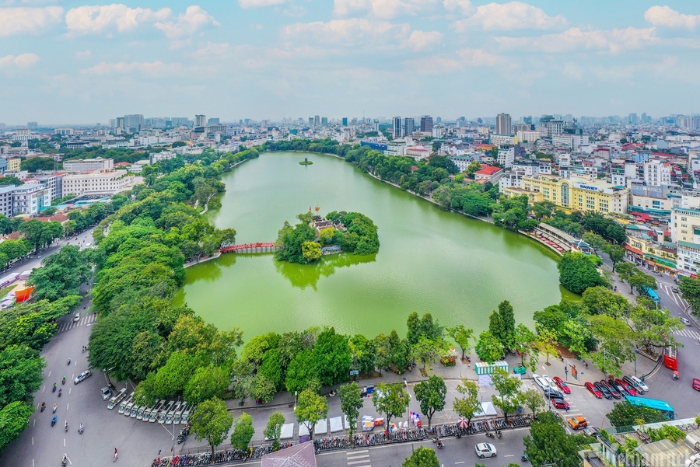
Spanning an area of approximately 3,358 square kilometres, Hanoi has become one of the 17 largest capital cities in the world. Known as the "city of lakes", Hanoi boasts numerous water bodies, including the iconic Hoan Kiem lake in the heart of the city and the expansive West Lake. While the urban core is a bustling metropolis with a mix of French colonial architecture, modern skyscrapers, and traditional Vietnamese buildings, the surrounding rural areas retain their agricultural charm with rice paddies, vegetable farms, and craft villages. This unique blend of urban and rural landscapes, coupled with a humid subtropical climate featuring four distinct seasons, makes capital Hanoi a diverse and enchanting destination.
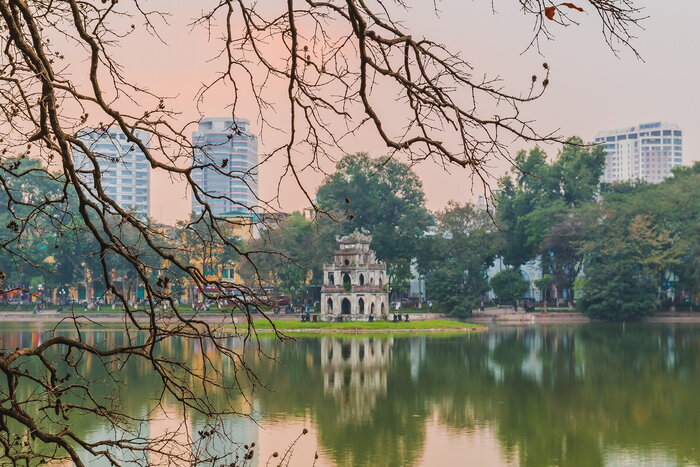
2. Hanoi Weather: The Optimal Time to Visit
Hanoi weather is quite typical of the Northern climate, experiences a humid subtropical climate with four distinct seasons, each offering its own unique charm :
- Spring (March to April) is particularly delightful, with mild temperatures and blooming flowers, creating a picturesque setting for visitors.
- Summer (May to August) brings hot and humid weather, along with frequent rains and occasional tropical storms, making it a vibrant yet challenging time for outdoor activities.
- Autumn (September to November) is widely regarded as the best time to visit Hanoi, with cooler temperatures, clear skies, and stunning foliage, providing ideal conditions for sightseeing and exploration.
- Winter (December to February) is characterised by cooler, sometimes chilly, weather with occasional drizzles, offering a serene and cosy atmosphere.
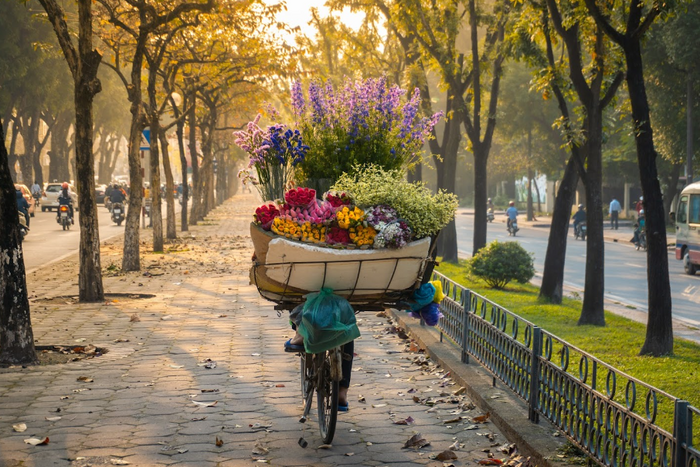
Each season in Hanoi offers a distinct experience, but for the most pleasant weather and optimal travel conditions, September to November or March to April stands out as the perfect time to explore this Vietnam capital. However, it's crucial to remember that the climate in this region can be unpredictable, with variations from year to year. To ensure a comfortable trip, check the weather forecast beforehand and pack clothing for different temperatures. For the best experience in Hanoi, consider avoiding the summer months (June to August), which are typically hot and humid, and the winter months (December to February), which can be cool and foggy.
3. History of capital
What is Hanoi famous for? Many people of the capital are always proud to introduce Hanoi as a land of civilization, a place associated with heroic historical periods of the Vietnamese people. Possessing an important strategic location, this was also the capital of most ancient feudal dynasties such as the Dinh, Ly, Tran, Le.
Hanoi Vietnam capital boasts a rich and eventful history that beckons travellers to explore its ancient streets and monumental landmarks. Prior to its establishment as Thang Long in 1010, this region was believed to be founded during the period of the Hung Kings, with Co Loa, a district in present-day Hanoi, serving as the capital. From 179 B.C. onwards, Hanoi was occupied by various Northern colonists and underwent numerous name changes, such as Tong Binh and Dai La.
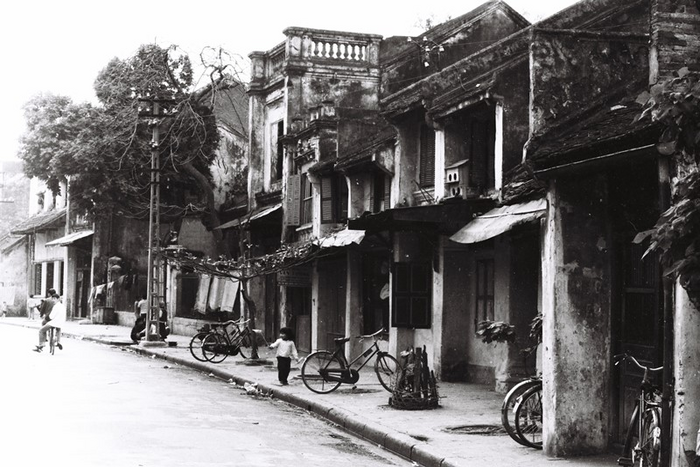
During the Ly Dynasty (1010-1787), Hanoi, then known as Thang Long, became the cultural, political, and economic centre of Vietnam. The city flourished until the Tay Son dynasty, when Emperor Quang Trung moved the capital to Hue. Under the Nguyen dynasty and later French colonisation (1787-1945), Hanoi once again rose to prominence. The French established Hanoi as the administrative centre in 1888, infusing the city with distinctive colonial architecture that still stands today.
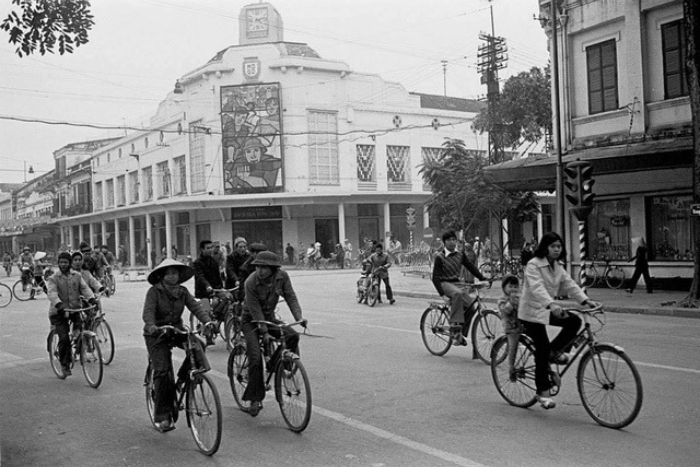
Throughout the Indochina War and the Vietnam War (1945-1975), capital Hanoi played a pivotal role as the headquarters for the reunification and liberation of Vietnam, enduring significant hardships and damage. After the wars, Hanoi slowly began to recover during the subsidy period. In 1999, UNESCO recognized Hanoi as a "city for peace", acknowledging its resilience and cultural significance.
4. Hanoi - a land rich in cultural heritage
Hanoi's culture is a rich tapestry of history and tradition, seamlessly blending ancient heritage with modern vibrancy. From its stunning architecture and traditional crafts to its flavorful cuisine and vibrant festivals, Hanoi offers a captivating glimpse into the heart of Vietnamese culture. That is shown through the following outstanding aspects:
Historical architecture: This Vietnam capital is proud of ancient architectural works such as Thang Long Imperial Citadel, Temple of Literature, Hanoi Old Quarters with red-tiled roofs and ancient houses… The street is sophisticated, imbued with a combination of both Eastern and Western, traditional and modern architecture
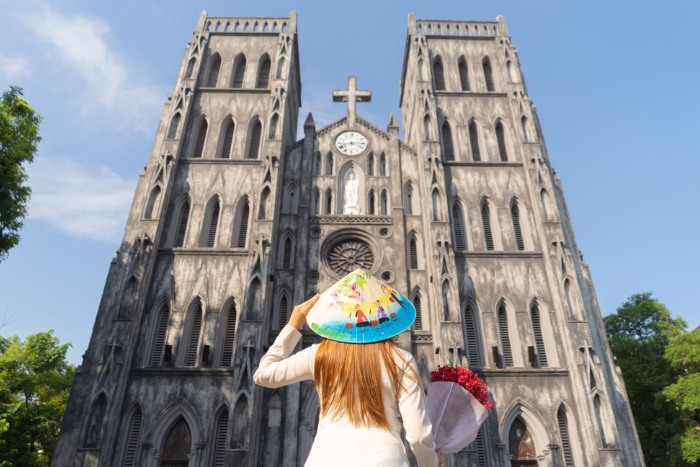
Traditional craft villages: Hanoi is surrounded by traditional craft villages that preserve ancient artisanal techniques such as Bat Trang pottery village, Quang Phu Cau incense incense village, Van Phuc silk village, Ngu Xa bronze casting village, and Dong Ho painting village. Each craft village has its own unique products, demonstrating the sophistication and skillful techniques of the artisans. These craft villages are not only places to produce handicraft products but also attractive tourist destinations, helping visitors understand more about the culture and history of this land.
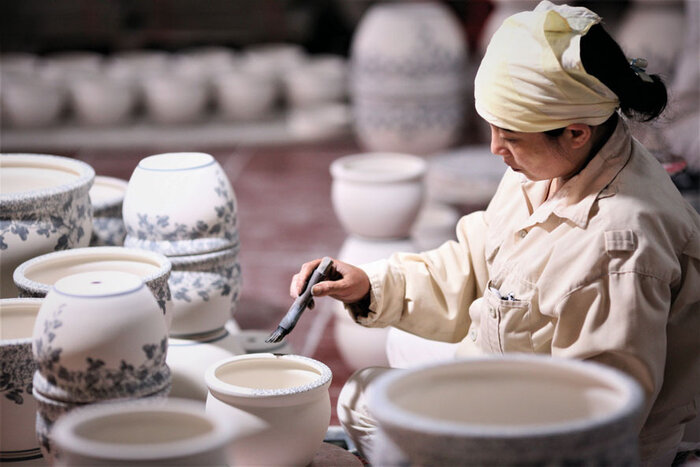
Traditional festivals & ceremonies: The culture of Hanoi is vividly showcased through its traditional festivals and ceremonies, including the Tet holidays, Perfume Pagoda Festival, Quan Thanh Temple Festival… These events significantly enrich and diversify the cultural life of Hanoi's inhabitants. Such traditions not only safeguard Hanoi's cultural heritage but also nurture a strong sense of community and continuity among its residents.
Hanoi people: What is Hanoi famous for? Hanoi people are known for their elegant personality, hospitality and sense of pride in their culture. The elegance of Hanoi people is expressed through their way of dressing, speaking and daily behaviour. Hanoi people are not only inheritors but also protectors and developers of traditional cultural values.

5. Hanoi - Culinary paradise for gourmets
Enjoying local cuisine, the best things to do in hanoi vietnam, is a culinary treasure that captivates the senses and offers an unforgettable culinary journey. Dubbed "the world's kitchen", famous for its balanced flavours, fresh ingredients and age-old recipes, Hanoi cuisine is a vivid reflection of Hanoi's rich cultural heritage here. The city's iconic dishes are loved both locally and globally, making it a paradise for food enthusiasts, something that keeps visitors coming to Vietnam.
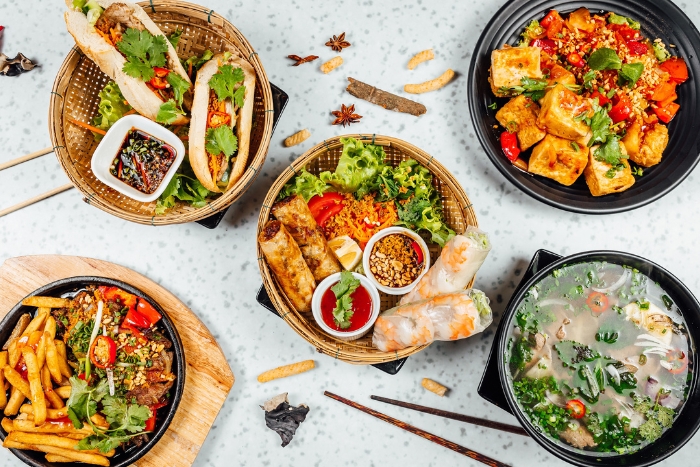
Hanoi's street food is an adventure in itself, with vendors lining the bustling streets and markets, offering countless delicious dishes. From crispy bread filled with meat, vegetables and herbs to delicate, savoury spring rolls, each bite tells a story of tradition and innovation. Don't miss egg coffee, a local specialty that combines rich Vietnamese coffee with a sweet egg yolk cream, providing a delightful end to any meal.
What is Hanoi famous for? Beyond individual dishes, Hanoi's culinary culture is also about shared enjoyment and a vibrant street scene. The city's night markets, such as Dong Xuan market, or small niches in Hanoi's 36 streets are perfect places to sample a variety of snacks and mingle with the locals. The richness of flavours and convivial atmosphere ensure that every meal in Hanoi is not just culinary but also an experience.
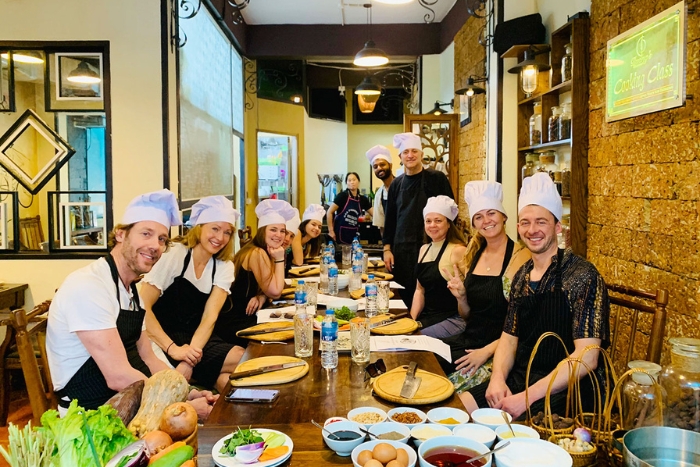
As honoured as the most attractive culinary destination in the world, Hanoi cuisine invites you to immerse yourself in a world of exciting flavours and rich culinary traditions. Whether you are a foodie or a curious traveller, Hanoi's delicious dishes and vibrant culinary culture will whet your appetite, making it a must-see destination for any food lover.
6. Distinctive Hanoi tourist attractions
Hanoi tourist attractions offer a rich tapestry of experiences that cater to all interests. From its historical landmarks and cultural treasures to its natural beauty and vibrant street life, Hanoi invites travellers to explore and discover the essence of Vietnam capital city. Whether you are a history buff, a culture enthusiast, or simply seeking new adventures, Hanoi promises an unforgettable journey.
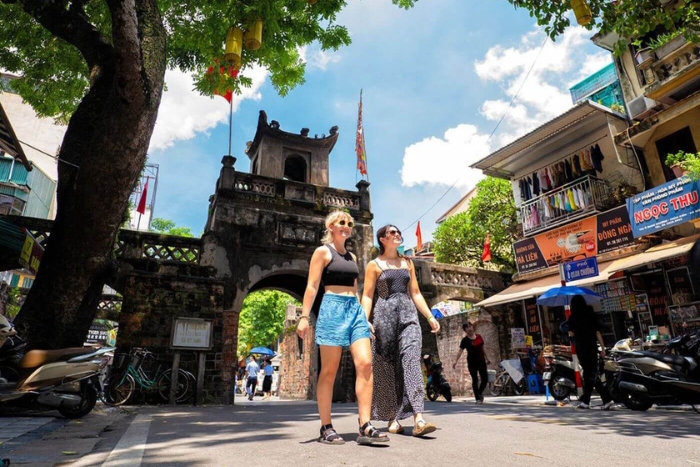
Experience vibrant capital with Best place to visit in Hanoi
Alongside the vibrant exploration journeys, Hanoi offers you a wide range of excellent accommodation options. From Hanoi luxury hotels with top-notch services and modern amenities to cosy homestay Hanoi rich in local culture, all serve as perfect stopovers. After a long day of discovery, you can relax in comfortable and peaceful surroundings, recharging for more exciting and novel adventures. The perfect blend of convenience and Hanoi's unique charm will surely provide you with memorable and fulfilling stays.
You can consider some tour from Hanoi for the best experience:
>>> Hanoi day trip
>>> Hanoi city tour 1 day
>>> Things to do in Hanoi for 3 days
>>> Hanoi Ha Giang Cao Bang Ban Gioc 6 days
>>> Hanoi day trip
>>> Hanoi city tour 1 day
>>> Things to do in Hanoi for 3 days
>>> Hanoi Ha Giang Cao Bang Ban Gioc 6 days
7. Time in Hanoi
When planning your visit to Hanoi, it's important to note that the city follows Indochina Time (ICT), which is UTC+7. This time zone places Hanoi ahead of cities in French or Spain by six hours, and behind Tokyo and Seoul by two hours. Understanding the local time helps in scheduling tours, making restaurant reservations, and coordinating activities effectively. Whether you're exploring the Old Quarter early in the morning or dining by Hoan Kiem Lake at sunset, being aware of the time ensures a seamless experience.
For travelers arriving from different time zones, adjusting your watch upon arrival and gradually syncing with local time can help minimize jet lag effects. Stay informed about daylight hours, with summer seeing sunrise around 5:00 AM and sunset around 7:00 PM, and winter shifting to sunrise around 6:30 AM and sunset around 5:30 PM. This knowledge enhances your ability to plan and enjoy your time exploring Hanoi's rich culture and attractions.
See more: Time in Vietnam
8. How to travel around Hanoi Vietnam?
Hanoi offers a diverse range of transportation options to explore the city and beyond with ease.You can consider experiencing Hanoi by some of the following popular means:
- Motorbikes or Taxis: For easy taxi bookings, use the Grab app, similar to Uber, by installing it and creating an account with your phone number. Alternatively, book the affordable SM Green Electric Taxi through their app or call (+84) 19002088.
- Metro: The city also has a single metro line running from Ha Dong to Cat Linh Station in Dong Da District, spanning 13 km, known for its cleanliness, safety, and comfort.
- Bus: This is a cost-effective way to see the city. The extensive, well-connected network covers all major attractions. Frequent and reliable, buses make navigating Hanoi's bustling streets easy for travelers.
- For inter-provincial travel, buses and trains connect Hanoi with various regions across Vietnam. If you need private car rentals for tours or business purposes, Autour Asia - Hanoi tour agency is a reliable choice for the best price.
Take advantage of the diverse transportation options in Hanoi to thoroughly explore the city's rich culture and beyond.
9. Some tips for tourists traveling to Hanoi, Vietnam
If you're planning a trip to Hanoi Vietnam, here are some essential tips to ensure you have an unforgettable and seamless travel experience:
- Currency Exchange: The official currency in Vietnam is the Vietnam Dong. It is advisable to exchange your money at Currency Exchange stations in tourist areas or city centres within Vietnam, as they typically offer better rates than those abroad.
- Crossing the Road: Hanoi's streets are bustling with traffic. When crossing, walk slowly and steadily, keeping an eye on the vehicles coming from both directions. Avoid running, as it increases the risk of being hit by motorbikes and cars.
- Respect the locals and their culture: Show respect by dressing appropriately, asking for permission before taking photos, and avoiding littering or damaging local property. Your courteous behaviour will be appreciated and will enhance your travel experience.
- Learn basic Vietnamese phrases: Knowing a few basic Vietnamese phrases can enhance your experience and help you connect with the locals. Phrases like “Xin chào” (Hello), “Cảm ơn” (Thank you), and “Tạm biệt” (Goodbye) are always appreciated.
What is Hanoi famous for? Hanoi offers a rich tapestry of experiences, blending historical charm with vibrant modernity. From exploring ancient temples and savouring local cuisine to navigating bustling streets and respecting local customs, every moment in Hanoi Vietnam promises to be memorable. By following these practical tips and immersing yourself in the cultural heritage of this dynamic city, your visit to vibrant city will be both enjoyable and enriching. Embrace the unique essence of Hanoi and create lasting memories on your journey through Vietnam's captivating capital.
We suggest you refer to the following circuits:
>>> Vietnam Trip Package Deals 14 Days
>>> Vietnam Tour 17 days
>>> Vietnam Packages Tours
>>> All our Vietnam Tours
>>> Vietnam Trip Package Deals 14 Days
>>> Vietnam Tour 17 days
>>> Vietnam Packages Tours
>>> All our Vietnam Tours
Related travel guide
Other similar articles
CUSTOMIZABLE BY LOCAL EXPERTS
Personalized trip at the original price!
REFUND GUARANTEE
We believe in our work and promise to give you money back.
GOOD PRICE / QUALITY
95% satisfied more than expected!
24/7 LOCAL SUPPORT
We are always available online to provide assistance at any time.
Most read articles
Autour Asia is highly recommended on
Embracing the mission of "Satisfied more than expected" and providing authentic experiences, we have received numerous recommendations on reputable travel forums:













